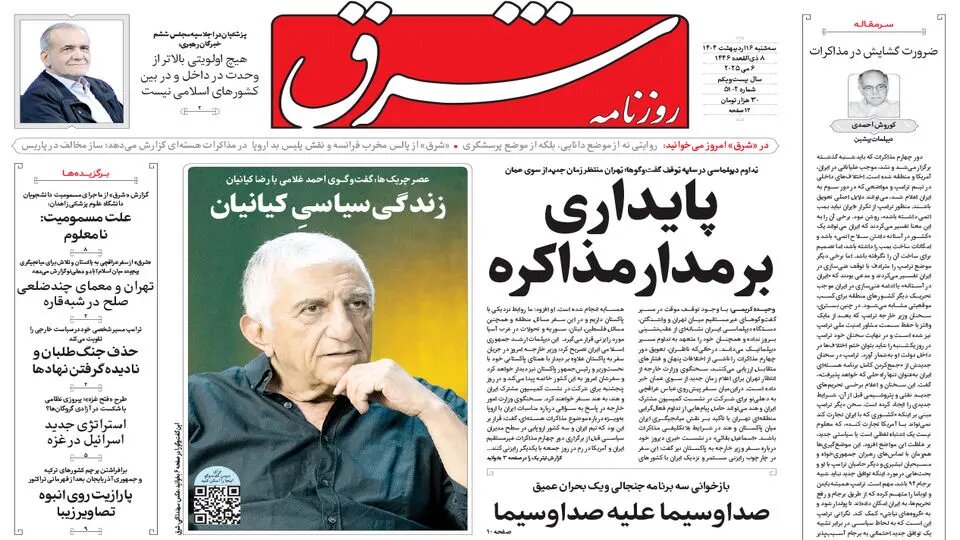France's duplicity

TEHRAN - In a note, Shargh addressed Paris's destructive approach in the Iran nuclear talks.
It wrote: The statements of French Foreign Minister Jean-Noel Barrot reflect Paris' two-faced and divisive approach and are a factor in the European Union's foreign policy towards the nuclear negotiations between Tehran and Washington. Accusations such as "Iran acquiring nuclear weapons or Iranian missiles threatening Marseille", without credible evidence, merely serve to escalate tensions and justify Paris' unrealistic remarks. France, as one of the parties to the JCPOA, could have played a constructive role in facilitating the talks, but Barrot's approach indicates a confrontational approach that is not consistent with the spirit of diplomacy. This destructive approach, in a situation in which the Tehran-Washington talks require a positive atmosphere and mutual trust, could lead to a decrease in Iran's motivation to continue the talks. Not to lose the chances of diplomacy, Paris should stop setting unrealistic conditions and sanctions threats and instead focus on the nuclear framework of the JCPOA.
Ettelaat: We should not wait for America
In an interview with Foad Izadi, an international affairs analyst, Ettelaat dealt with the domestic issues after the postponement of the Iran-U.S. negotiations. He said: To improve the condition, it is necessary to focus on domestic assets and potential, and negotiations can definitely bring more achievements for the country. Lifting sanctions is in the hands of the U.S. Congress, but the majority of Congress members are supporters of Netanyahu and Israel. Therefore, we cannot wait for the lifting of sanctions. So, we should try to interact with countries that want to work with Iran. In fact, we should learn from the Americans' disloyalty to their promises and rely on our assets instead of fruitless negotiations and looking to the West. Considering sanctions as the only cause of problems is a strategic mistake. So, instead of waiting for America and European countries, let's seek cooperation with neighboring countries and focus on expert knowledge in managing national affairs. In this way, we can solve our problems one by one.
Arman-e-Melli: Trump will not leave the negotiations
Arman-e-Melli spoke with Morteza Makki, an international relations analyst, about an ambiguous outlook surrounding the Iran-U.S. negotiations. He said: With the postponement of the fourth round of Iran-U.S. negotiations and dismissal of Waltz (Trump’s national security advisor), the prospect of the nuclear talks is ambiguous. When Trump entered the White House, he announced that he would resolve the Ukraine crisis very soon, but this did not happen. In these circumstances, Trump needs an important achievement in the international arena. It is not unlikely that Trump is looking to reach an agreement with Iran in the short term and present it as an important international achievement. Waltz's dismissal can even be evaluated as a positive signal toward reaching an agreement with Iran. It is unlikely that Trump will leave the negotiating table with Iran at this stage. This is while in the current situation, Iran has a serious will to reach an agreement. The situation has changed, and today Iran is serious about reaching an agreement. The important point in this regard is that Iran is in a very sensitive situation and that is why it has made the best decision, which is dialogue and diplomacy.
Javan: Trump not seeking to bring the negotiations to deadlock
In a commentary, Javan wrote: After the October 7 incident, Iran emerged as a greater threat to the Zionist regime, and this led their collaborative think tanks of Israel and the U.S. to reach the option of negotiations. Although the Zionist regime is trying to express its dissatisfaction with the negotiations through anti-Iran rhetoric, the text and hypertext in the statements of the Zionist regime’s officials indicate that the regime’s opposition is not related to negotiations. Even if the demands of the Israeli lobbyists are pursued by Trump, the regime is satisfied with it. As Trump announced last week after a telephone conversation with Netanyahu, he agrees with him on all issues. For this reason, the U.S. seeks to gradually increase pressure on Iran to the point of no return, but not to bring the negotiations to a deadlock. They want to impose conditions on the continuation of talks and put forward America's "list of demands."
Leave a Comment